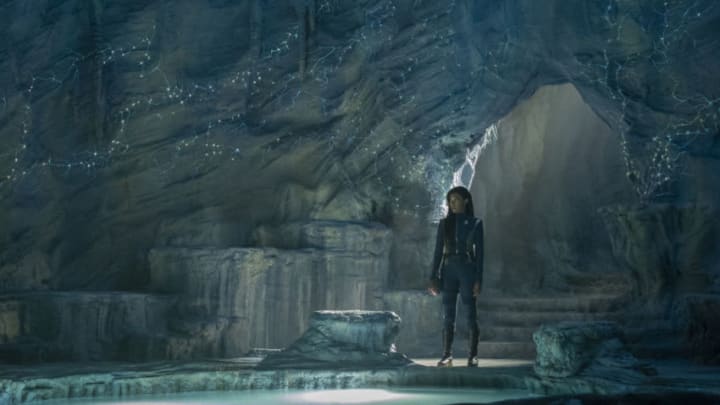“Forget Me Not” is an episode Nebula Award and Hugo Award voters should remember when casting their ballots this year. The fourth episode of Star Trek: Discovery‘s third season is a beautifully written, performed, and directed exploration of how trauma and loss can shape or misshape us, depending on whether we come to terms with their presence in our life’s tapestry.
Here are five moments from “Forget Me Not” Star Trek: Discovery viewers will not soon forget!
Rough reception on Trill
It’s a delight to see the planet Trill again, for only the second time in franchise history (the first was in Star Trek: Deep Space Nine’s “Equilibrium”). But the thrill of Trill is gone when the planet’s leaders realize the Tal symbiont’s current host is a human.
This scene showcases Star Trek in its finest morality play mode. Is Adira’s joining an “abomination” or a “miracle,” an offensive challenge to cherished traditions or a hopeful way forward into an uncertain future?
By the episode’s end, we’ll realize the authorities’ answer matters less than Adira’s own.
Saru’s dinner party goes sour
Anyone who’s ever suffered through an awkward Thanksgiving dinner can’t help but feel bad for Saru!
His dinner party for the crew begins well, as everyone—even, albeit reluctantly, Georgiou—reaffirms their “aye” of commitment to each other. But later, an impromptu haiku contest sparks multiple personal meltdowns.
The sequence careens from humorous to horrifying, but Discovery’s cast makes it work. These people are hurting. By the dinner’s premature end, we’re hurting for them. Emily Coutts especially shines in what is no doubt Detmer’s meatiest moment in the series to date.
“Welcome to the circle”
Finally having relived the trauma of Gray’s death and the transfer of the Tal symbiont, Adira is able to see (and, later, name) all of Tal’s previous hosts—a “circle” of acceptance to which Adira now forever belongs.
In its own way, Adira’s journey in “Forget Me Not” makes the same argument Captain Kirk makes when rebuking Sybok’s in Star Trek V: The Final Frontier. Our pain, whatever form it takes, forms us. We must name and accept it before we can truly name and accept ourselves or experience true acceptance from others.
The ship’s computer cares for the Discovery crew
In other Star Trek stories, when a ship’s computer develops sentience, the results range from annoying to dangerous.
But in Star Trek: Discovery, the stirrings of the computer’s personality, catalyzed by its absorption of the sphere data from season 2, seems a positive development.
Saru interprets the computer’s choice to screen a holographic Buster Keaton short for the crew as evidence of the sphere data’s desire to protect those who protected it.
Viewers who’ve seen the Short Treks episode “Calypso” will recall how Zora, the abandoned Discovery’s self-aware computer, projected Funny Face for Craft to help his healing (and her own). Georgiou even takes a popcorn box from Linus that looks just like the box from which Craft was munching.
Whether or not we’re seeing Zora’s birth (the voices sound similar at times), we’re watching a welcome outbreak of joy for Discovery’s traumatized crew.
Adira and Gray practice playing the cello
The episode’s last scene lets us in on Adira’s secret. Adira can still see and talk to Gray as though Gray is still alive.
Neither one knows why or how. Gray’s continued presence is a mystery that persists until the season’s close.
But beyond establishing an intriguing plot puzzle, this scene gives us a metaphor for any loving relationship. Year by year, day by day, moment by moment, the important question is, “How is this supposed to work?”
Few honest people would claim to have definitive answers. But the relationships that do work are the ones in which everyone involved “keeps practicing,” believing “we can do better.”
What are your favorite moments from “Forget Me Not”? Let us know in the comments!
